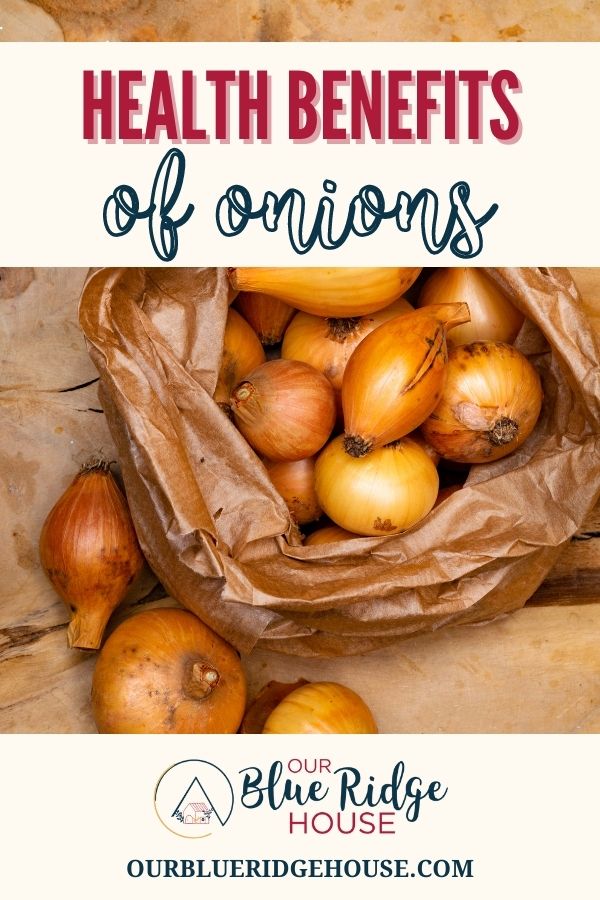More Than Flavor: Unpacking the Incredible Health Benefits of Onions
The humble onion. A culinary cornerstone, a tear-jerking staple, a flavor foundation in cuisines across the globe. For millennia, it has been diced, sliced, minced, and caramelized, forming the aromatic bedrock of countless dishes. Yet, beneath its papery skin and pungent layers lies a story far richer than mere seasoning. This is the narrative of Allium cepa, a bulbous marvel whose incredible health benefits have been whispered through ancient texts, celebrated in traditional medicine, and now, rigorously validated by modern science.
To truly appreciate the onion is to embark on a journey – a deep dive into its fascinating history, its complex biochemistry, and the profound impact it can have on human health. For the discerning palate and the curious mind, the onion is not just an ingredient; it is a testament to nature’s profound wisdom, a miniature pharmacy disguised as a vegetable.
A Tapestry of Time: The Onion’s Ancient Roots and Enduring Reverence
Our story begins not in a modern kitchen, but in the fertile crescent, thousands of years ago. Onions are among the oldest cultivated vegetables, with archaeological evidence suggesting their consumption dates back to 5000 BC. Their enduring nature – easy to grow, store, and transport – made them indispensable to early civilizations.
The Egyptians revered onions, not just as food, but as symbols of eternity, their concentric rings mirroring the cycles of life. They were depicted in hieroglyphics, offered to deities, and even buried with pharaohs, believed to aid the deceased in the afterlife. Roman gladiators consumed them for strength, while Greek athletes gnawed on them to purify their blood. In the Middle Ages, onions were more than sustenance; they were prescribed as remedies for everything from headaches to snakebites, and even used as a form of currency.
This ancient reverence wasn’t born purely of superstition. Though lacking the tools of modern biochemistry, our ancestors instinctively recognized the onion’s profound impact on well-being. They observed its ability to ward off illness, soothe ailments, and invigorate the body. Their empirical wisdom laid the groundwork for the scientific discoveries that would one day unveil the true mechanisms behind the onion’s extraordinary power.
The Chemical Symphony: Unveiling the Onion’s Bioactive Arsenal
To understand the onion’s health benefits is to understand its chemistry. Far from a simple collection of water and carbohydrates, the onion is a veritable metropolis of bioactive compounds, each playing a crucial role in its overall therapeutic profile. This complex interplay creates a synergistic effect, where the sum is far greater than its individual parts.
At the forefront of the onion’s phytochemical arsenal are two major classes of compounds: flavonoids and organosulfur compounds. These are the true heroes of our story, responsible for the onion’s distinctive flavor, aroma, and, most importantly, its remarkable health-promoting properties.
Quercetin: The Unsung Hero of the Flavonoid Family
Among the myriad flavonoids found in onions, quercetin stands out as a true superstar. It’s a plant pigment, responsible for some of the color in red and yellow onions, and is one of the most abundant and potent antioxidants in the plant kingdom. Its concentration in onions is exceptionally high, particularly in the outer layers and closer to the root.
Quercetin is a multitasking marvel. It’s a powerful antioxidant, capable of neutralizing harmful free radicals that contribute to cellular damage and chronic diseases. But its prowess extends far beyond simple antioxidant activity. Quercetin is also a potent anti-inflammatory agent, inhibiting the production and release of inflammatory mediators in the body. This dual action – antioxidant and anti-inflammatory – is a cornerstone of many of the onion’s therapeutic effects.
Beyond these broad actions, quercetin has been meticulously studied for its specific roles in:
- Cardiovascular Health: It helps improve blood vessel function, reduce blood pressure, and prevent the oxidation of LDL cholesterol, a key step in atherosclerosis.
- Anti-Allergic Properties: Quercetin acts as a natural antihistamine, stabilizing mast cells and reducing the release of histamine, a compound responsible for allergic reactions.
- Anti-Cancer Potential: More on this later, but quercetin has shown remarkable promise in inhibiting cancer cell growth and inducing apoptosis (programmed cell death) in various cancer lines.
Organosulfur Compounds: The Pungent Powerhouses
These are the compounds that give onions their characteristic pungency and, famously, make us cry. When an onion is cut or crushed, enzymes are released that rapidly convert sulfur-containing amino acids into a range of volatile organosulfur compounds. These include thiosulfinates, sulfoxides, and disulfides, among others. While the specific compounds differ slightly from those found in garlic (allicin, for example, is primarily in garlic), the principle of enzymatic transformation into highly bioactive sulfur compounds is similar.
These compounds are highly reactive and contribute significantly to the onion’s therapeutic profile:
- Cardioprotective Effects: They help reduce cholesterol and triglyceride levels, prevent blood clot formation, and improve circulation.
- Detoxification Support: Organosulfur compounds stimulate the production of enzymes in the liver that are crucial for detoxifying harmful substances and carcinogens from the body.
- Antimicrobial Activity: Historically recognized, these compounds possess potent antibacterial, antiviral, and antifungal properties.
Beyond the Big Two: A Rich Supporting Cast
While quercetin and organosulfur compounds steal the spotlight, the onion’s health benefits are further bolstered by a diverse array of other valuable nutrients:
- Fructans (e.g., FOS): These are soluble dietary fibers that act as prebiotics, feeding beneficial gut bacteria and promoting a healthy microbiome.
- Vitamins: Onions are a good source of Vitamin C, a powerful antioxidant and immune booster, and B vitamins (B6, folate), essential for metabolism and nerve function.
- Minerals: They provide potassium (important for blood pressure regulation), manganese (involved in antioxidant defense), and trace amounts of other essential minerals.
- Other Phenolic Acids: Beyond flavonoids, onions contain other phenolic acids like ferulic acid and caffeic acid, which also contribute to their antioxidant capacity.
This intricate chemical symphony works in concert, creating a profound and multifaceted impact on human health.
Unpacking the Benefits: A Deep Dive into Onion’s Therapeutic Prowess
With its rich chemical profile understood, we can now explore the specific health benefits that elevate the onion far beyond a mere culinary accent.
1. The Antioxidant Powerhouse: Battling Oxidative Stress
Our bodies are constantly exposed to free radicals – unstable molecules generated by normal metabolic processes, pollution, UV radiation, and stress. These free radicals can damage cells, DNA, and proteins, leading to a state called oxidative stress, which is implicated in aging and the development of numerous chronic diseases, including cancer, heart disease, and neurodegenerative disorders.
Onions, brimming with quercetin, vitamin C, and other phenolic compounds, are formidable antioxidant powerhouses. They effectively scavenge these free radicals, neutralizing their damaging effects and protecting cellular integrity. This foundational benefit underpins many of the onion’s other therapeutic actions, creating a robust defense system for the body.
2. The Anti-inflammatory Maestro: Quelling the Flames Within
Chronic inflammation is now recognized as a silent killer, a fundamental driver of most chronic diseases, including heart disease, diabetes, arthritis, certain cancers, and neurodegenerative conditions. Unlike acute inflammation, which is a necessary part of healing, chronic low-grade inflammation smolders unchecked, slowly damaging tissues and organs.
Here, the onion’s anti-inflammatory properties shine, largely thanks to its high concentration of quercetin. Quercetin effectively dampens the inflammatory cascade by inhibiting enzymes involved in inflammation (like COX-1 and COX-2, similar to NSAIDs but without the side effects), and by modulating the release of pro-inflammatory mediators. The organosulfur compounds also contribute to this anti-inflammatory effect. By reducing systemic inflammation, onions play a crucial role in preventing and managing a wide range of debilitating conditions.
3. The Cardiovascular Guardian: Protecting the Heart and Vessels
Heart disease remains the leading cause of death worldwide. The onion offers a compelling array of cardioprotective benefits, making it a true ally for cardiovascular health.
- Blood Pressure Regulation: Quercetin acts as a natural ACE inhibitor, helping to relax blood vessels and lower blood pressure. The potassium content also contributes to maintaining healthy blood pressure levels.
- Cholesterol Management: Organosulfur compounds have been shown to help reduce levels of LDL ("bad") cholesterol and triglycerides, while potentially increasing HDL ("good") cholesterol. Quercetin prevents the oxidation of LDL cholesterol, a critical step in the formation of arterial plaque.
- Anti-Platelet Aggregation: Some organosulfur compounds possess anti-platelet aggregation properties, meaning they help prevent blood clots that can lead to heart attacks and strokes.
- Improved Endothelial Function: The overall antioxidant and anti-inflammatory effects help maintain the health and flexibility of the blood vessel lining (endothelium), which is vital for proper circulation.
Regular consumption of onions, therefore, can contribute significantly to a healthier heart and a reduced risk of cardiovascular events.
4. The Anti-Cancer Crusader: A Promising Ally in Prevention
Perhaps one of the most exciting and extensively researched areas of onion health benefits is its potential role in cancer prevention and treatment. Numerous studies, both epidemiological and laboratory-based, have highlighted the onion’s anti-cancer properties.
The mechanisms are multifaceted:
- Inhibition of Cancer Cell Growth: Quercetin and organosulfur compounds have been shown to inhibit the proliferation of various cancer cell lines, including those of the colon, stomach, breast, lung, prostate, and ovaries.
- Induction of Apoptosis: These compounds can trigger programmed cell death (apoptosis) in cancer cells, essentially forcing them to self-destruct without harming healthy cells.
- DNA Protection: The potent antioxidants in onions protect DNA from damage, which is a key step in preventing the initiation of cancer.
- Anti-Angiogenesis: Some onion compounds may inhibit angiogenesis – the formation of new blood vessels that supply tumors with nutrients, effectively starving them.
- Detoxification Enhancement: Organosulfur compounds enhance the activity of phase I and phase II detoxification enzymes in the liver, which are crucial for neutralizing carcinogens and removing them from the body.
Epidemiological studies have consistently shown a correlation between higher onion consumption and a reduced risk of several cancers, particularly colorectal and stomach cancers. While onions are not a cure for cancer, their regular inclusion in the diet offers a powerful protective effect.
5. Blood Sugar Regulator: A Friend to Diabetics and Those at Risk
For individuals managing diabetes or seeking to prevent its onset, onions offer valuable support in regulating blood sugar levels.
- Improved Insulin Sensitivity: Some compounds in onions, including quercetin and chromium, may help improve insulin sensitivity, allowing cells to more effectively absorb glucose from the bloodstream.
- Reduced Glucose Absorption: Certain sulfur compounds have been observed to reduce the absorption of glucose from the gut.
- Antioxidant Protection: The antioxidant properties also help protect pancreatic beta cells (which produce insulin) from oxidative damage, preserving their function.
While onions should not replace conventional diabetes management, they are a beneficial dietary addition for blood sugar control.
6. Bone Health Supporter: More Than Just Dairy
When we think of bone health, dairy often comes to mind. However, emerging research suggests that onions also play a role in maintaining strong bones.
- Reduced Oxidative Stress: The antioxidant compounds in onions help reduce oxidative stress in bone cells, which can contribute to bone loss.
- Anti-inflammatory Effects: Chronic inflammation can negatively impact bone density, and the anti-inflammatory properties of onions help mitigate this.
- Sulfur’s Role: Sulfur is a vital component of connective tissues, including cartilage and bone. The organosulfur compounds in onions contribute to the overall sulfur pool in the body, potentially supporting bone matrix integrity.
Studies have indicated that regular onion consumption may help reduce the risk of osteoporosis, particularly in postmenopausal women.
7. Gut Health Ally: Nourishing the Microbiome
The health of our gut microbiome is increasingly recognized as central to overall well-being, influencing everything from digestion and immunity to mood and metabolism. Onions are excellent allies in promoting a thriving gut environment.
- Prebiotic Power: Onions are rich in fructans, particularly fructooligosaccharides (FOS), which are soluble dietary fibers. FOS are not digested by human enzymes but travel to the colon where they serve as a potent food source for beneficial gut bacteria, such as Bifidobacteria and Lactobacilli.
- Improved Digestion: By nourishing these beneficial bacteria, onions help maintain a balanced gut flora, which is essential for efficient digestion, nutrient absorption, and the production of short-chain fatty acids (SCFAs) that nourish colon cells.
- Immune System Support: A healthy gut microbiome is intimately linked to a robust immune system. By supporting gut health, onions indirectly bolster our body’s defenses.
8. Immune System Architect: Fortifying Our Defenses
A strong immune system is our first line of defense against pathogens and illness. Onions contribute to immune health through several pathways:
- Vitamin C Content: As a potent antioxidant, Vitamin C is crucial for immune cell function and plays a vital role in fighting off infections.
- Quercetin’s Modulatory Role: Quercetin has immunomodulatory properties, meaning it can help regulate immune responses, preventing both under-activity and over-activity (which can lead to autoimmune issues). Its antihistamine action also aids in mitigating allergic immune responses.
- Antimicrobial Properties: The organosulfur compounds in onions exhibit direct antimicrobial activity against various bacteria (including E. coli and Salmonella), viruses, and fungi, offering an additional layer of protection.
- Anti-inflammatory Effects: By reducing chronic inflammation, onions help free up immune resources to focus on actual threats rather than constant internal battles.
9. Detoxification Assistant: Aiding the Body’s Natural Cleansing
Our bodies are constantly working to eliminate toxins from the environment and metabolic byproducts. The liver plays a central role in this detoxification process, and onions can provide valuable support.
The organosulfur compounds in onions help to upregulate and enhance the activity of phase I and phase II detoxification enzymes in the liver. These enzymes are responsible for transforming toxins into water-soluble compounds that can be easily excreted from the body. By supporting these crucial enzymatic pathways, onions contribute to the body’s natural cleansing mechanisms.
The Spectrum of Onions: Color, Pungency, and Bioavailability
Not all onions are created equal, though all offer remarkable benefits. The different varieties – red, yellow, and white – possess varying concentrations of their potent compounds, subtly altering their therapeutic profiles.
- Red Onions: Generally have the highest concentration of anthocyanins (another type of flavonoid, responsible for their deep purple hue) and often higher levels of quercetin, particularly in their outer layers. Their vibrant color is a visual cue of their antioxidant richness.
- Yellow/Brown Onions: These are the most common cooking onions and are also excellent sources of quercetin and organosulfur compounds.
- White Onions: Tend to be milder in flavor and contain slightly lower levels of flavonoids compared to their red and yellow counterparts, but still offer significant health benefits.
Bioavailability and Preparation: The way we prepare onions can also influence the bioavailability of their beneficial compounds.
- Raw vs. Cooked: While cooking can slightly reduce the concentration of some heat-sensitive compounds like Vitamin C, it can paradoxically increase the bioavailability of certain flavonoids like quercetin by breaking down cell walls and making them more accessible. However, prolonged high-heat cooking can degrade organosulfur compounds.
- Light Cooking is Key: Sautéing, roasting, or caramelizing onions until they are tender but not overly browned helps to preserve many of their beneficial compounds while enhancing their flavor.
- Don’t Discard the Outer Layers: The outermost edible layers of onions (just beneath the papery skin) are often the richest in flavonoids, so try to retain as much of them as possible when peeling.
Embracing the Onion: A Culinary and Health Imperative
Armed with this profound understanding of the onion’s health benefits, its status transforms from a mere background ingredient to a central player in a holistic approach to well-being. It is a testament to the idea that nature provides powerful medicine in the most accessible and delicious forms.
Incorporating more onions into your diet is simple and endlessly versatile:
- Raw: Thinly sliced in salads, sandwiches, and salsas to maximize their fresh enzymatic activity and crisp texture.
- Sautéed/Caramelized: As the aromatic base for soups, stews, sauces, and stir-fries, lending depth and sweetness.
- Roasted/Grilled: Adding a smoky, sweet flavor to vegetables, meats, and skewers.
- Pickled: A tangy addition to elevate any dish, offering a different flavor profile.
- In Juices/Smoothies: For the truly adventurous, a small amount can add a surprising nutritional punch.
And what about the tears? The very compounds responsible for those stinging sensations – the volatile organosulfur compounds – are precisely some of the ones delivering those powerful health benefits. So, as you chop, consider those tears a small, momentary tribute to the incredible healing potential being unleashed.
Conclusion: The Unfolding Legacy of the Humble Bulb
From the ancient fields of Mesopotamia to the cutting-edge laboratories of modern science, the onion has journeyed through time, its profound impact on human health continually rediscovered and reaffirmed. It is a prime example of how traditional wisdom, when subjected to rigorous scientific scrutiny, often reveals deeper truths.
More than just flavor, more than just a culinary workhorse, the onion is a miniature marvel of nature – an antioxidant arsenal, an anti-inflammatory agent, a cardiovascular guardian, an anti-cancer crusader, and a tireless supporter of our gut and immune systems. Its concentric layers conceal a symphony of bioactive compounds, each playing a vital role in promoting vitality and protecting against disease.
So, the next time you reach for this humble bulb, pause for a moment. Appreciate not just its culinary versatility, but its rich history and its extraordinary capacity to nourish, heal, and protect. Embrace the onion, not merely as an ingredient, but as a powerful ally in your journey towards optimal health. It is a testament to nature’s profound wisdom, beautifully packaged in a simple, indispensable form, waiting to unleash its incredible benefits upon us all.






